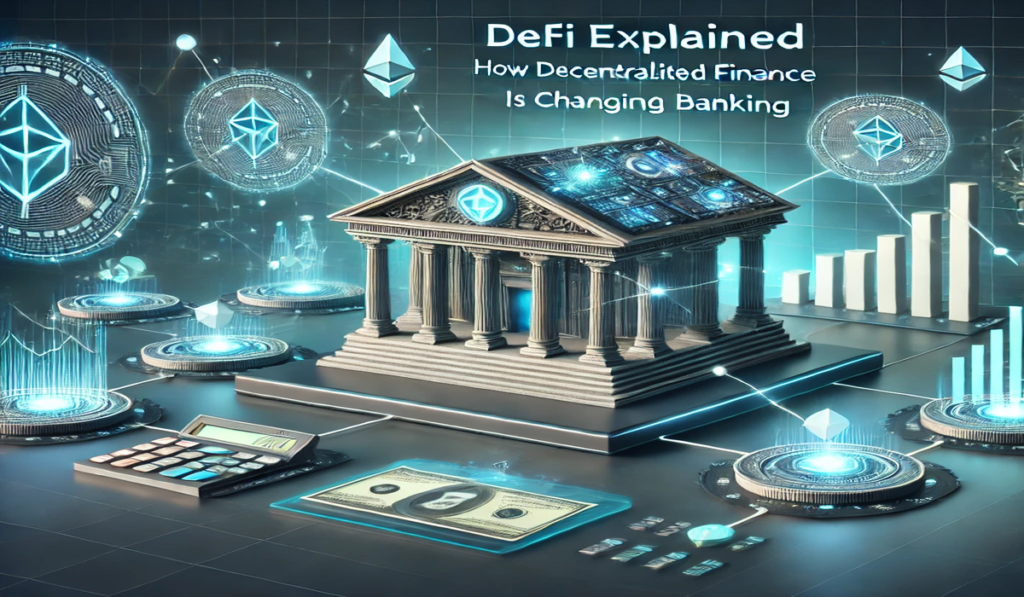The financial world is undergoing a revolution with Decentralized Finance (DeFi)—a blockchain-based alternative to traditional banking that eliminates middlemen. This guide explains what DeFi is, how it works, and why it could replace banks in the future.
1. What is DeFi?
Decentralized Finance (DeFi) refers to financial services (lending, trading, investing) built on blockchains (mostly Ethereum) that operate without banks, brokers, or governments.
🔹 Key Features of DeFi:
✔ Permissionless – Anyone with an internet connection can use it.
✔ Trustless – No need to rely on banks (smart contracts handle transactions).
✔ Transparent – All transactions are recorded on a public blockchain.
✔ Global – Available 24/7, with no borders or restrictions.
2. How DeFi Works
DeFi runs on smart contracts (self-executing code) instead of traditional institutions. Here’s how it compares to traditional finance:
| Function | Traditional Finance | DeFi |
|---|---|---|
| Lending | Banks act as intermediaries | Peer-to-peer via smart contracts |
| Payments | Slow, expensive cross-border fees | Instant, low-cost crypto transfers |
| Trading | Stock exchanges (NYSE, Nasdaq) | DEXs like Uniswap, PancakeSwap |
| Savings | Low-interest bank accounts (0.1% APY) | High-yield DeFi protocols (5-20% APY) |
3. Top DeFi Use Cases
💰 1. Decentralized Lending & Borrowing
- How it works: Users deposit crypto as collateral and borrow instantly.
- Top Platforms: Aave, Compound, MakerDAO.
- Example: Deposit ETH → Borrow USDC (no credit check).
💱 2. Decentralized Exchanges (DEXs)
- How it works: Trade crypto directly without KYC or middlemen.
- Top Platforms: Uniswap, PancakeSwap, Curve.
- Example: Swap ETH for USDT in seconds.
📈 3. Yield Farming & Liquidity Mining
- How it works: Provide liquidity to DeFi pools and earn rewards.
- Top Platforms: Yearn Finance, Balancer.
- Example: Deposit ETH + USDC → Earn trading fees + token rewards.
🏦 4. Stablecoins (DeFi’s “Cash”)
- How it works: Crypto pegged to fiat (e.g., USDC, DAI) for stability.
- Use Case: Earn interest (8-12% APY) instead of 0.1% in banks.
🛡️ 5. Insurance & Derivatives
- How it works: Hedge risks or insure against smart contract hacks.
- Top Platforms: Nexus Mutual, Opyn.
4. Why DeFi is Disrupting Traditional Banking
🚀 Advantages Over Banks
✔ Higher Returns – Earn 5-20% APY vs. 0.1% in savings accounts.
✔ No Gatekeepers – No credit checks, paperwork, or approval delays.
✔ 24/7 Access – No bank holidays or downtime.
✔ Global & Inclusive – Serves the unbanked (1.7B people worldwide).
⚠️ Risks & Challenges
❌ Smart Contract Hacks – Over $3B lost in 2022 (Rekt.News).
❌ Regulation Uncertainty – Governments may restrict DeFi.
❌ Volatility – Crypto prices can crash, affecting loans & collateral.
❌ User Error – Wrong transactions are irreversible.
5. How to Start Using DeFi
🔹 Step-by-Step Guide
- Get a Crypto Wallet (MetaMask, Trust Wallet).
- Buy Ethereum (ETH) or Stablecoins (USDC, DAI).
- Connect to a DeFi Platform (Uniswap, Aave).
- Start Earning (lend, trade, or provide liquidity).
🔐 Safety Tips
✔ Use Ledger/Trezor for large holdings.
✔ Avoid shady projects (check audits on CertiK).
✔ Start small to learn before committing big funds.
6. The Future of DeFi
- Institutional Adoption – Banks & hedge funds are entering DeFi.
- Layer 2 Scaling – Faster, cheaper transactions (Arbitrum, Optimism).
- Regulation – Governments may impose rules (but won’t kill DeFi).
- Mass Adoption – Could replace legacy finance for millions.
Final Verdict: Will DeFi Replace Banks?
- Short-term: DeFi complements traditional finance.
- Long-term: Could replace banks for lending, payments, and investing if security improves.
🚀 Ready to explore DeFi? Start with small amounts and learn as you go!
What’s your favorite DeFi platform? Share in the comments!
Last Updated: [Insert Date]
📌 FAQ
Q: Is DeFi safer than banks?
A: No—banks have FDIC insurance; DeFi has higher risks but higher rewards.
Q: Can I lose money in DeFi?
A: Yes—hacks, scams, and market crashes can wipe out funds.
Q: Do I need KYC for DeFi?
A: No (unless using a centralized gateway like Coinbase).
Want a guide on the best DeFi platforms for beginners? Let me know! 🚀
